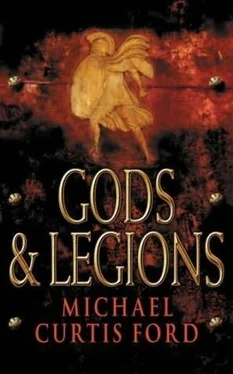Michael Ford - Gods and Legions
Здесь есть возможность читать онлайн «Michael Ford - Gods and Legions» весь текст электронной книги совершенно бесплатно (целиком полную версию без сокращений). В некоторых случаях можно слушать аудио, скачать через торрент в формате fb2 и присутствует краткое содержание. Жанр: Исторические приключения, на английском языке. Описание произведения, (предисловие) а так же отзывы посетителей доступны на портале библиотеки ЛибКат.
- Название:Gods and Legions
- Автор:
- Жанр:
- Год:неизвестен
- ISBN:нет данных
- Рейтинг книги:3 / 5. Голосов: 1
-
Избранное:Добавить в избранное
- Отзывы:
-
Ваша оценка:
- 60
- 1
- 2
- 3
- 4
- 5
Gods and Legions: краткое содержание, описание и аннотация
Предлагаем к чтению аннотацию, описание, краткое содержание или предисловие (зависит от того, что написал сам автор книги «Gods and Legions»). Если вы не нашли необходимую информацию о книге — напишите в комментариях, мы постараемся отыскать её.
Gods and Legions — читать онлайн бесплатно полную книгу (весь текст) целиком
Ниже представлен текст книги, разбитый по страницам. Система сохранения места последней прочитанной страницы, позволяет с удобством читать онлайн бесплатно книгу «Gods and Legions», без необходимости каждый раз заново искать на чём Вы остановились. Поставьте закладку, и сможете в любой момент перейти на страницу, на которой закончили чтение.
Интервал:
Закладка:
Two centuries and a half before this time, when the Emperor Trajan had himself followed this precise path in attacking King Sapor's ancestor, he had had the foresight to bring with him a remarkable detachment of engineers, led by a hydrographic genius whose name has been lost to us, but whose works remain more enduring than those of Trajan himself. This man had seen from his study of the elevations and the lay of the land that a canal could be cut between the two rivers, diverting water from the Euphrates to convey ships to the Tigris. Indeed, Trajan had performed this very task, and though the great work had later been filled in by the Persians, a century later Severus reexcavated it in a similar effort. Again the Persians filled it in, this time blocking the water head with enormous boulders and disguising the actual course of the canal so that future generations would be unable to find it. They had not counted on Julian's persistence, however. After quickly assembling a pontoon bridge across the Euphrates, over which his entire army crossed, he captured and interrogated numerous peasants and farmers in the area. By doing so, he was able to ascertain the precise path where the soil was looser and more fertile than that of the surrounding river plains, and setting his own engineers to the task, they discovered the traces of the ancient canal and the boulders that had been rolled into place to block the flow.
It was an easy matter to dig it out again, once forty thousand men were put to work on it. A matter of a week of solid mudslinging, to which even Julian contributed his share, stripping naked and standing shoulder-deep in the enormous ditch like the lowliest slave, exhorting his men to haul the rubble and dirt of the generations for the glory of Rome. With a rush and a surge when the last boulder was removed, the mighty Euphrates immediately dropped two feet in depth downstream of the canal entrance and the enormous fleet sailed merrily upon a tide of muddy water to its junction with the Tigris, where it anchored scarcely two miles upstream and across from the city of Ctesiphon itself.
When he arrived at the Tigris in the lead vessel, festooned with the banners and standards of all his legions and lined with a ceremonial guard of burly legionaries, Julian was hardly able to concentrate on the task at hand. He gave scarcely a glimpse toward the massive walls of the city now visible just downriver, but rather focused an unrelenting gaze on the horizon to the northwest, anxiously anticipating the arrival of Sapor at the head of his hordes at any time. He prayed aloud that Sapor might have been delayed, or even defeated, by the forces of Armenia in alliance with his general Procopius, from whom he had not heard a word since the split of the armies weeks before.
'It's suicide,' Victor exclaimed, glancing at the other generals gathered in the tent to ascertain their support. 'Utter suicide!'
Outside, we could hear the cheers of the troops gathered on the near bank of the Tigris in the waning light of the early evening as the horse races continued. Julian had ordered a spontaneous series of games to celebrate our imminent arrival at Ctesiphon, hastily laying out a Coliseum-sized horse track, sandpits for the wrestling and boxing events, and a long, straight course along the shore for the footraces. He had gone so far as to delineate precisely where the spectators — the bulk of the footsore army — were to stand for the betting and lusty cheering of their comrades, carefully arranging it so that the blare of the trumpets and the roar of the excited troops would carry over the water to the left bank of the river, even to the city itself. He had also taken the precaution of posting military guards at discrete intervals along the water's edge to prevent spectators from gathering on that side to watch the events. He wanted the Persian garrison on the other side of the river to have an unimpeded view of the activity, and in this he was rewarded, for like low-caste Romans able to afford only the cheap seats at the games, the entire Ctesiphon garrison, some twenty or thirty thousand men, had gathered in ranks a quarter mile across the water, watching the proceedings with huge interest. They hauled stools and blankets to the water's edge and passed wine flasks among themselves, cheering on their favorites and audibly moaning when they lost, and in general behaving precisely as if they were guests — which they were, by personal invitation of the Roman Emperor. He observed it all with amused satisfaction.
Another deep roar drowned out Victor's comments in the tent. When it had subsided, Julian glared at the other generals, pointedly ignoring Victor's pessimism.
'Delaying,' he said dismissively, 'will not make the river any narrower, nor the opposite bank any lower. Time will only make the enemy's position stronger, their numbers greater. Our success cannot be achieved by waiting — we must act now. The enemy is relaxed, thinking our men will spend tonight in revelry. There is no better opportunity. Rome cannot wait.' He then turned away.
Sallustius stood up and made to leave. 'Unload the largest vessels,' he ordered the others, 'and form them into three squadrons. Keep the men reveling — the more noise, the better. It will keep the garrison off its guard. At midnight we move. Victor, you lead with five vessels. Directly across and a mile downstream. Take the beachhead silently to divide the garrison from the city. The rest of the fleet, carrying the army, will then join you, squadron by squadron. Now, move.'
The generals filed silently out into the evening's dusty heat, leaving Julian and me alone in the tent. He bent silently over his work for a time while I reviewed some notes, occasionally pausing to look up as some particularly raucous cheering wafted in through the door from outside. After a while he sat back against the frame post and stretched, rubbing his eyes wearily. Suddenly he stopped and gazed at me, as if having just noticed my presence.
'Caesarius,' he said, almost apologetically. 'Still the only man in the entire camp who will stay awake with me. Still the truest friend I have.' He grinned at me, and shook his head slowly.
I smiled back, but said nothing, and he noticed the air of hesitancy about me, my unwillingness to fully accept his olive branch, to repair the friendship that had been so deeply cracked at the palace the previous year. A shadow passed over his face, and his eyes grew troubled.
'And yet there is still that distance between us,' he said. 'That barrier, which I created, which I am unable to tear down. You still begrudge me my rudeness at that wretched banquet — Caesarius, if I haven't told you before, I will do so now: I am truly sorry for my behavior that night.'
I shook my head. 'It's not that — that is long past. But you're right, the barrier is there. I can't help but regret your hostility toward your past, to all things Christian, to-'
He interrupted my words with an exasperated sigh, standing up suddenly and walking to the side of his table, where he commenced pacing.
'Does it always come down to that, Caesarius? You still refuse to compromise, to even meet me halfway? I have outlawed no religion, I have thrown no man to the lions or the gladiators — is it not enough that I allow all sects to peacefully coexist within the Empire? Why must I kiss the feet of the Pope before you will be satisfied?'
'Because God does not coexist with other gods,' I said simply.
'No?' He whirled on me, his face flushed and excited. 'Caesarius, we have marched through the desert and conquered the lands of the most powerful king Persia has known in generations. We have destroyed every stronghold we have encountered along the way — all to the steady beat of our paeans to Ares, and with our hands washed in the blood of the sacrificial oxen. Surely, if your God were so jealous of other gods, he would not have allowed me such success in battle? Caesarius, Caesarius — be rational! By insisting that I worship as you do, that I enslave myself to your God, you mock me! You mock everything I have accomplished thus far!'
Читать дальшеИнтервал:
Закладка:
Похожие книги на «Gods and Legions»
Представляем Вашему вниманию похожие книги на «Gods and Legions» списком для выбора. Мы отобрали схожую по названию и смыслу литературу в надежде предоставить читателям больше вариантов отыскать новые, интересные, ещё непрочитанные произведения.
Обсуждение, отзывы о книге «Gods and Legions» и просто собственные мнения читателей. Оставьте ваши комментарии, напишите, что Вы думаете о произведении, его смысле или главных героях. Укажите что конкретно понравилось, а что нет, и почему Вы так считаете.












